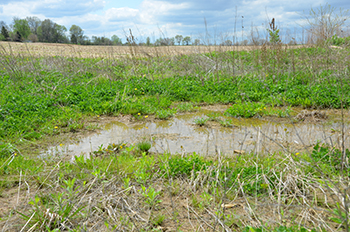Stay Informed
Without proper permits, farmers could be up the creek
 At times this year, seemingly anywhere in Indiana could have been considered “wet” land.
At times this year, seemingly anywhere in Indiana could have been considered “wet” land.
Aptly named, wetlands refer to saturated ground where water covers the soil, or resides at or near the surface all year long, or at least portions of the year, including the growing seasons for plants.
Wetlands are commonly identified by three indicators: soils, vegetation and hydrology. Simply put, these indictors reflect the significant presence of ground and/or surface water, the water’s impact on the constitution of the soil, as well as the types of plants that are capable of growing in such saturated conditions.
To be a jurisdictional wetland (protected by the Clean Water Act), all three indicators must be present during some portion of the plants’ growing season. That distinction is incredibly important for farmers looking to bring ground into crop production, said Justin Schneider, INFB’s state government relations director.
Whenever doing any sort of construction on the farm, even clearing trees or fencerows, it is critical to obtain the proper permitting, Schneider noted. Performing these activities without the proper permit or permits could violate state or federal law, resulting in penalties.
Relying on a determination from the Natural Resources Conservation Service might not be enough, Schneider noted. Below are three permits that may also be required:
Section 401 Water Quality Certification
- Needed prior to dredging, filling, excavating or altering the shoreline of a wetland or any other regulated body of water.
- Applications for this permit must be submitted to IDEM.
Section 404 (part of the Clean Water Act)
- Needed prior to dredging, excavating, placing fill materials or using heavy equipment with a wetland or any other regulated body of water.
- Applications for this permit must be submitted to the U.S. Army Corps of Engineers.
- A Section 401 Water Quality Certification must be obtained first.
Isolated Wetland Permit
- Determinations of the need for this permit are done by the U.S. Army Corps of Engineers.
- Applications for this permit must be submitted to IDEM.
For more details and application information, visit www.wetlands.in.gov or call 800-451-6027 extension 3-8488. When it comes to any wetland projects, farmers are always best to ere on the side of caution and contact IDEM first, so as to avoid costly penalties.




